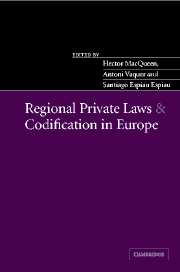Book contents
- Frontmatter
- Contents
- List of contributors
- Acknowledgements
- List of abbreviations
- Introduction
- 1 The civil law in European codes
- 2 ‘A token of independence’: debates on the history and development of Scots law
- 3 The Scottish civil code project
- 4 Scots law in Europe: the case of contract
- 5 Scottish property: a system of Civilian principle. But could it be codified?
- 6 ‘… Quae ad ius Cathalanicum pertinet’: the civil law of Catalonia, ius commune and the legal tradition
- 7 The codification of Catalan civil law
- 8 Unification of the European law of obligations and codification of Catalan civil law
- 9 From revocation to non-opposability: modern developments of the Paulian action
- 10 Epistle to Catalonia: romance and rentabilidad in an anglophone mixed jurisdiction
- 11 Estonia and the new civil law
- 12 The positive experience of the Civil Code of Quebec in the North American common law environment
- 13 From the code civil du bas Canada (1866) to the code civil Quebecois (1991), or from the consolidation to the reform of the law: a reflection for Catalonia
- 14 The evolution of the Greek civil law: from its Roman–Byzantine origins to its contemporary European orientation
- Index
5 - Scottish property: a system of Civilian principle. But could it be codified?
Published online by Cambridge University Press: 30 July 2009
- Frontmatter
- Contents
- List of contributors
- Acknowledgements
- List of abbreviations
- Introduction
- 1 The civil law in European codes
- 2 ‘A token of independence’: debates on the history and development of Scots law
- 3 The Scottish civil code project
- 4 Scots law in Europe: the case of contract
- 5 Scottish property: a system of Civilian principle. But could it be codified?
- 6 ‘… Quae ad ius Cathalanicum pertinet’: the civil law of Catalonia, ius commune and the legal tradition
- 7 The codification of Catalan civil law
- 8 Unification of the European law of obligations and codification of Catalan civil law
- 9 From revocation to non-opposability: modern developments of the Paulian action
- 10 Epistle to Catalonia: romance and rentabilidad in an anglophone mixed jurisdiction
- 11 Estonia and the new civil law
- 12 The positive experience of the Civil Code of Quebec in the North American common law environment
- 13 From the code civil du bas Canada (1866) to the code civil Quebecois (1991), or from the consolidation to the reform of the law: a reflection for Catalonia
- 14 The evolution of the Greek civil law: from its Roman–Byzantine origins to its contemporary European orientation
- Index
Summary
Introduction
This chapter is restricted to the principles of derivative acquisition applying to the voluntary transfer of corporeal property, the most important part of any system of property law. The regulation of the passing of property will be considered on the basis of the prerequisites of derivative acquisition and by reference to the exceptions to these requirements. Given the objective of a conclusion as to the feasibility of code provisions applying to the transfer of ownership only matters of property law as such will be considered. Issues of the law of obligations, or of other areas of law, will not be dealt with.
The chapter will proceed on the premise – having outlined its basis – that in Scots common law the essential principles of derivative acquisition apply to the voluntary transfer of both moveable and immoveable (Scot. ‘heritable’) subjects. In seeking to demonstrate that the common principles concerned are essentially civilian the categories of moveable and immoveable property will be dealt with together with relevant differences noted as necessary.
In respect of both categories the applicable principles of the common law (of Scotland) will be considered under the following headings: the requirement that the parties are in a position to pass and acquire ownership (entitlement); the requirement that the parties intend the passing of ownership and the basis on which this requirement operates (intention aspect); the requirement of delivery (delivery); the circumstances in which ownership passes regardless of the prescribed requirements not being met (positive exceptions); the circumstances in which ownership does not pass in a final sense regardless of the prescribed requirements being met (negative exception).
- Type
- Chapter
- Information
- Regional Private Laws and Codification in Europe , pp. 118 - 135Publisher: Cambridge University PressPrint publication year: 2003



